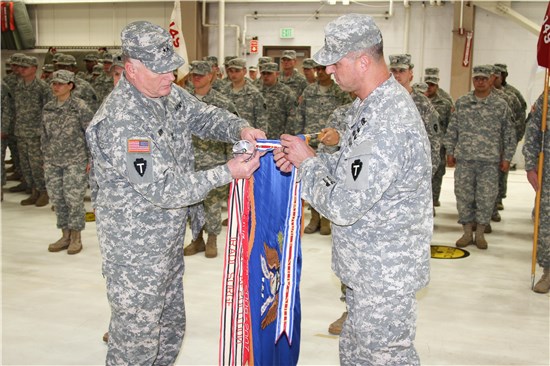 |
| Maj. Gen. James K. "Red" Brown, commander of the 36th Infantry Division, and Col. Rick Adams place the Valorous Unit Award on the "colors" of the 1-149th Attack-Reconnaissance Battalion during a ceremony held at Ellington Field. The unit was awarded this high honor for exceptional performance during Operation Iraqi Freedom. The 1-149th is an AH-64 "Apache" battalion assigned to the 36th Combat Aviation Brigade and earned the award for their 2006-2007 deployment to Iraq. (U.S. Army photo by Maj. Randall Stillinger/Released) |
The 1st of the 149th Attack Reconnaissance Battalion (ARB) was recently awarded the Valorous Unit Award (VUA) for combat actions in the skies over Iraq, in support of Operation Iraqi Freedom.
Considered the unit equivalent of the Silver Star, the award was presented nearly seven years following their actions in Iraq.
The 1-149th, along with E Troop, 1-104th Cavalry (Mississippi) and A Company, 1-135th ARB (Missouri), deployed for a year with the 36th Combat Aviation Brigade (CAB) in 2006 providing AH-64 “Apache” helicopter support as a Corps-level asset across the country.
Citing the battalion’s significant impact on the war in the volatile Al Anbar province in western Iraq, the citation states, “the tenacity of the aircrews to engage the enemy and the constant drive of the units’ support elements enhanced the ability of coalition forces to bring the fight to the enemy, destroyed the enemy’s initiative and provided a safer and more secure existence for the people of Ar Ramadi, Iraq.”
The 1-149th’s success stems from their support of various units from across the U.S. military during the “pre-surge” and into the “surge” phases, one of the most deadly periods during the war.
“The units performed superbly as a corps-level attack helicopter battalion, providing aerial weapons teams to the United States Army brigade combat teams, the Marine Expeditionary Force and Naval SEAL teams,” the citation states.
During combat operations, the battalion’s fleet of aircraft sustained significant damage due to the aircrew’s willingness to fly low and stay close to the fight, often drawing fire away from the ground troops they were supporting. In addition to the VUA, aviators from the 1-149th received 12 Distinguished Flying Crosses (DFC) and 39 Air Medals for Valor in the skies over Iraq.
Two of the DFC’s were awarded after what became known as the Battle of Donkey Island on June 30th, 2007.
During a ground attack against 20 insurgents guarding a weapons cache in Ar Ramadi, a U.S. Soldier was wounded by enemy forces. Medevac aircraft were unable to transport the critically-wounded soldier to a treatment facility.
A 1-149th “Apache” landed on the battlefield and placed the wounded Soldier in the front seat of the aircraft. The co-pilot/gunner strapped himself to the aircraft fuselage, outside the cockpit, and the pilot flew the aircraft and wounded soldier to a medical facility.
Col. Rick Adams, commander of the Austin-based 36th CAB, served as the 1-149th’s commander during the Iraq deployment.
Adams, of Austin, said, “I was honored and humbled to serve with such a capable team of men and women. Their endurance and tenacity saved lives while turning the tide of combat in Iraq.”
The deployment to Iraq was Adams’ third tour, fighting with both active duty and National Guard Apache battalions.
“I would not trade the Soldiers, skills and dedication of the 1-149th,” Adams said.
During the ceremony, the award streamer was placed on the battalion’s guidon by Col. Adams and 36th Infantry Division Commander, Maj. Gen. James K. “Red” Brown.
The ceremony also included the official welcome home of B Company, 1-149th ARB which recently returned from a combat deployment to Tarin Kowt, Afghanistan.
Adams, who visited B Company during their recent deployment, said he was “absolutely impressed by the graduate level of combat they had mastered. From our time in Iraq, I knew they were highly skilled and courageous warriors, but now they were doing it in extremely challenging, high-altitude environments, which requires perfect power management.”
“I was further impressed by the fluid and seamless integration they made with the special operations teams they supported,” Adams said.
The 36th CAB returned home from a deployment to the Middle East in support of Operation Enduring Freedom just before Christmas.
Current proposals under consideration by the Department of Defense include the option of having the 1-149th transfer their Apache helicopters to the Active Duty forces.
The full citation awarding the Valorous Unit Award to the 1-149th ARB:
For extraordinary heroism in action against an armed enemy of the United States: During the period Aug. 22, 2006, to July 8, 2007, 1st Battalion, 149th Aviation Regiment, and the cited units, E Troop, 1-104th CAV and A Company, 1-135th ARB displayed extraordinary heroism in support of Operation Iraqi Freedom. The units performed superbly as a corps-level attack helicopter battalion, providing aerial weapons teams to the United States Army brigade combat teams, the Marine Expeditionary Force and Naval SEAL teams working in Ar Ramadi, Al Anbar Province, Iraq. The tenacity of the aircrews to engage the enemy and the constant drive of the units’ support elements enhanced the ability of coalition forces to bring the fight to the enemy, destroyed the enemy’s initiative and provided a safer and more secure existence for the people of Ar Ramadi, Iraq. The dedication of the Soldiers of the 1st Battalion, 149th Aviation Regiment and the cited units, to continuously accomplish the mission in the face of imminent danger, is in keeping with the finest traditions of military service and brings great credit upon the units, the 36th Combat Aviation Brigade, Multi-National Corps-Iraq and the United States Army.